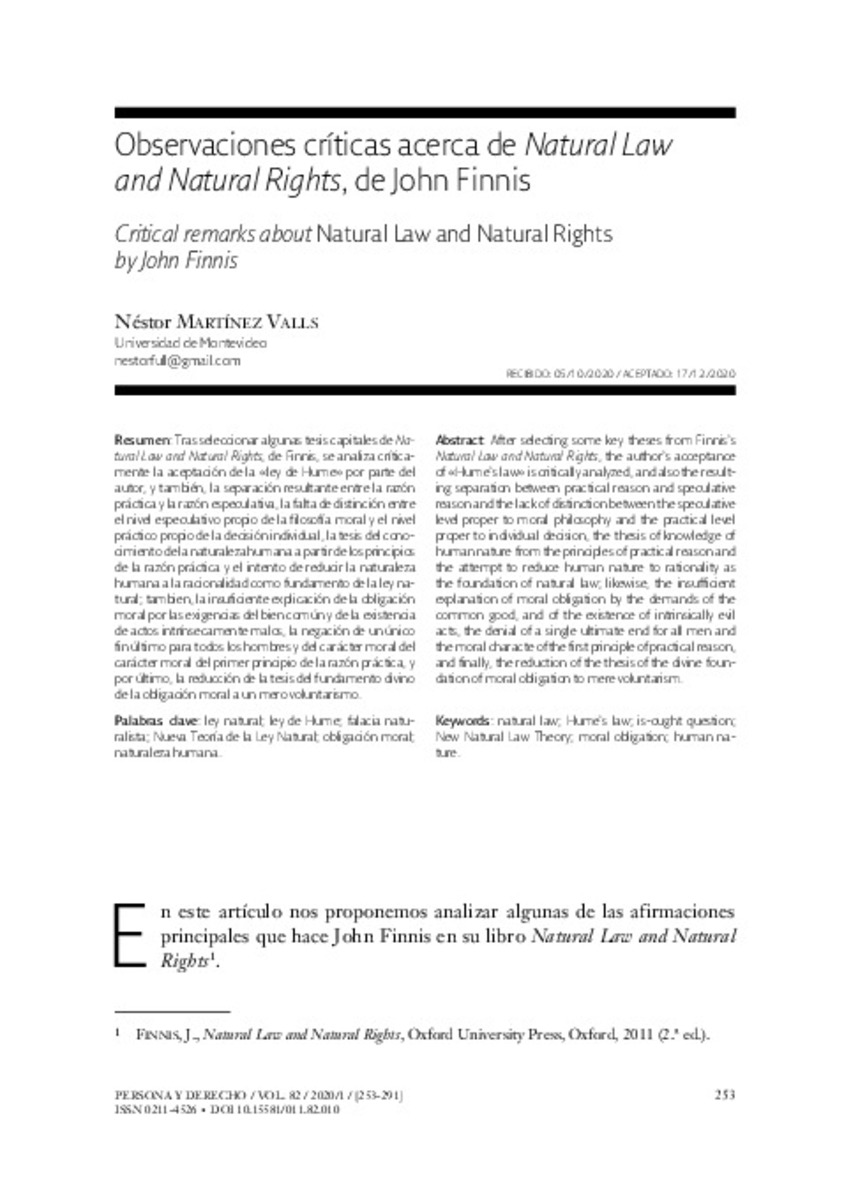Full metadata record
| DC Field | Value | Language |
|---|---|---|
| dc.creator | Martínez-Valls, N. (Néstor) | - |
| dc.date.accessioned | 2020-12-28 | - |
| dc.date.accessioned | 2021-08-25T09:36:43Z | - |
| dc.date.available | 2021-08-25T09:36:43Z | - |
| dc.date.issued | 2020 | - |
| dc.identifier.citation | Martínez-Valls, N. (Néstor). "Observaciones críticas acerca de «Natural Law and Natural Rights», de John Finnis". Revista Persona y Derecho. 82, 2020, 253 - 291 | es |
| dc.identifier.issn | 0211-4526 | - |
| dc.identifier.uri | https://hdl.handle.net/10171/61647 | - |
| dc.description.abstract | After selecting some key theses from Finnis’s <em>Natural Law and Natural Rights</em>, the author’s acceptance of «Hume’s law» is critically analyzed, and also the resulting separation between practical reason and speculative reason and the lack of distinction between the speculative level proper to moral philosophy and the practical level proper to individual decision, the thesis of knowledge of human nature from the principles of practical reason, and the attempt to reduce human nature to rationality, as the foundation of natural law; the insufficient explanation of moral obligation by the demands of the common good, and of the existence of intrinsically evil acts, the denial of a single ultimate end for all men, the denial of the moral character of the first principle of practical reason, and the reduction of the thesis of the divine foundation of moral obligation to mere voluntarism. | en_US |
| dc.description.abstract | Tras seleccionar algunas tesis capitales de <em>Natural Law and Natural Rights</em>, de Finnis, se analiza críticamente la aceptación de la «ley de Hume» por parte del autor, y también, la separación resultante entre la razón práctica y la razón especulativa, la falta de distinción entre el nivel especulativo propio de la filosofía moral y el nivel práctico propio de la decisión individual, la tesis del conocimiento de la naturaleza humana a partir de los principios de la razón práctica, y el intento de reducir la naturaleza humana a la racionalidad, como fundamento de la ley natural; la insuficiente explicación de la obligación moral por las exigencias del bien común, y de la existencia de actos intrínsecamente malos, la negación de un único fin último para todos los hombres, la negación del carácter moral del primer principio de la razón práctica, y la reducción de la tesis del fundamento divino de la obligación moral a un mero voluntarismo. | es_ES |
| dc.language.iso | spa | - |
| dc.publisher | Servicio de Publicaciones de la Universidad de Navarra | es_ES |
| dc.rights | info:eu-repo/semantics/openAccess | es_ES |
| dc.subject | Ley natural | - |
| dc.subject | Ley de Hume | - |
| dc.subject | falacia naturalista | - |
| dc.subject | Nueva Teoría de la Ley Natural | - |
| dc.subject | obligación moral | - |
| dc.subject | naturaleza humana | - |
| dc.title | Observaciones críticas acerca de «Natural Law and Natural Rights», de John Finnis | es_ES |
| dc.title.alternative | Critical remarks about «Natural Law and Natural Rights» by John Finnis | en_US |
| dc.type | info:eu-repo/semantics/article | es_ES |
| dc.identifier.doi | 10.15581/011.82.010 | - |
| dadun.citation.endingPage | 291 | - |
| dadun.citation.publicationName | Revista Persona y Derecho | - |
| dadun.citation.startingPage | 253 | - |
| dadun.citation.volume | 82 | - |
Files in This Item:
Statistics and impact
Items in Dadun are protected by copyright, with all rights reserved, unless otherwise indicated.






